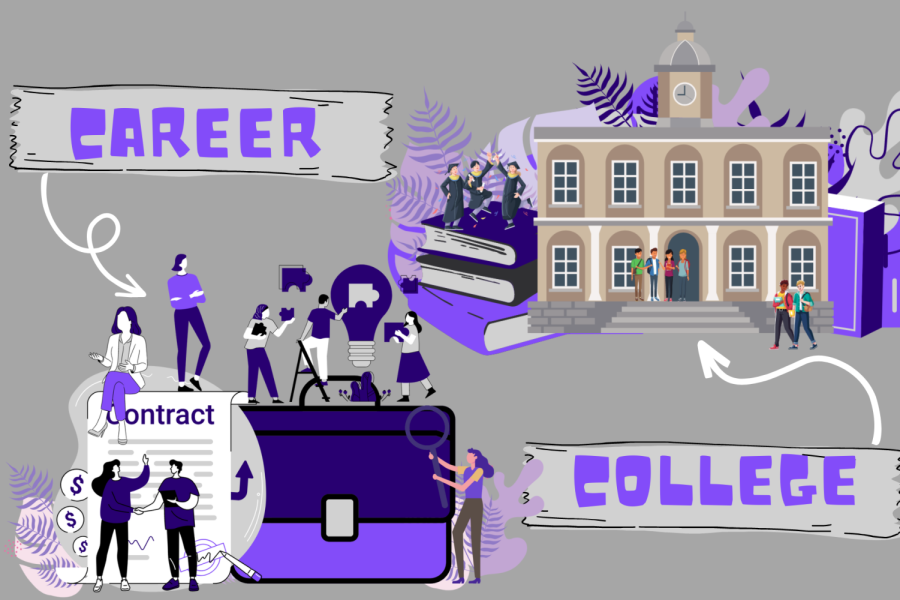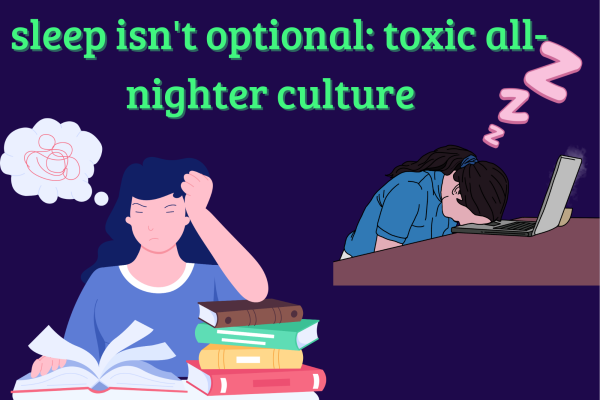Is college really worth the time, tuition, and trouble?
Graphic designed by: Kassidy Coleman
With the rising cost of college, some students might be wondering if college is worth it.
College applications opened on Sunday, Oct. 1 with the last day to submit applications for the Fall 2023 semester being Wednesday, Nov. 30. With college season in full swing, students may be asking themselves the question: is college worth it?
The idea of college or some higher education is pushed heavily when many students are young. Starting in elementary school where the idea of future careers is introduced, students are bombarded with positive messages about why they should attend college.
Children and teenagers consume these messages from teachers, adults, their peers, and even from movies and TV. They all say one thing: college is an amazing experience that is going to catapult one to success.
However, college comes with a price tag, and as people mature, the amount of money they might spend on college becomes somewhat of a turnoff. Despite that though, numerous studies show that people who earn college degrees make more money than those with a high school diploma or GED.
This is known as the wage gap. The wage gap is the significant difference in pay between high school graduates and college graduates. On average there is a difference of $20,000 in pay between the two groups. The reason for the wage gap is that employees with more knowledge on the job get paid more as opposed to someone with less knowledge and in need of more training.
In an article posted on Money.com, Adam Hardy discusses the wage gap between high school and college graduates.
“According to the Federal Reserve Bank of New York, the median income for a high school graduate is $30,000, while those with a bachelor’s degree make around $52,000,” Hardy said in the article.
Attending college provides a wonderful opportunity for students to interact with people from a diverse range of backgrounds.
In a U.S. News article, Josh Moody talks about how diversity in college and why it matters. Stating how interactions with students of different backgrounds can shape minds and ideas.
“Colleges emphasize a diverse class because different perspectives allow students to learn from one another,” Moody said in his article.
Moody also discussed how colleges want more diverse student bodies. He said colleges look for a diverse student body to enrich student experience.
In college, a person’s time is not just spent learning and studying for exams. Classes help people develop problem-solving, critical thinking, teamwork, and organization skills that can be necessary for the workforce.
It is true that someone could acquire these skills through other means; however, the opportunity to gain this kind of practical experience is a significant component of why college could be a good investment for a lot of people.
And college is just that, an investment. Like most investments, it may seem like someone is not getting much from it in the beginning, but in the long run, what one has invested in ends up benefiting them later. Whether that is through better jobs or overall happiness later in life.
According to a CNBC article about how college may affect one’s happiness, author Cory Stieg provided data from the Journal of Economic Perceptive.
“In a survey that utilized data from the U.S. General Social Surveys, 94% of people with a bachelor’s degree or more reported feeling happy or very happy with their lives overall, while 89% of high school grads said the same,” Stieg said in the journal.
Stieg even went on to say that education can lead to better, longer, healthier lives and stable marriages.
In spite of the fact that college graduates seem to be more successful, sometimes college is only for some, but someone can still be successful either way. For example, Bill Gates and Steve Jobs did not earn colleges degree, and they still experienced great success in business. They are of course part of the exception, not the rule.
Jobs attended Reed college before dropping out six months later. After dropping out he founded the company Apple and went on to make billions of dollars.
In 2005, Jobs gave a commencement speech at Stanford University. In his speech, he talked about three stories from his life that significantly impacted him.
“If I had never dropped out. I would have never dropped in on this calligraphy class, and personal computers Might not have two wonderful typography that they” Jobs said during his speech.
Jobs admitted that even though he dropped out of college, without the college classes he had stumbled upon, MacBooks wouldn’t be as successful as they are.
So despite the fact that Jobs dropped out of college and was able to be successful, he still utilized the college education he received to benefit him.
According to Forbes, people aged 25 to 34 years old without a college degree had a 76% employment rate. This is a high number than years prior, but it is lower than the 86% of people within the same age group that obtained college degrees.
This information is not meant to scare one into thinking that one cannot be successful without college. The initial question should have been raised differently considering there are other options opposed to a traditional four-year college experience. There is more than one path on the road to success. However, one thing is for certain college is worth it. And there are many ways to get there.

Kassidy Coleman is a senior at RCHS, and this is her first year in journalism. She is the Assistant Editor for the school newspaper, The Cat’s Eye. Her...











Astrid Jenkins • Dec 1, 2022 at 9:32 pm
This really got me thinking!!!!! Thanks so much for the insight.